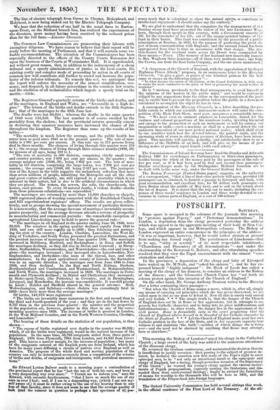POSTSCRIPT.
SATURDAY.
Some space is occupied in the columns of the journals this morning by "protests against Popery," and " Protestant demonstrations." In London, a deputation from the clergy presented yesterday the address which was agreed to in the aggregate meeting of their body at Sion Col- lege, and which appears in our Metropolitan columns. The Bishop of London expressed an entire concurrence in the principles of the address : "it was so important, however, that he would rather abstain at present from making any formal reply." The parishioners of Limehouse—that is to say, " sixty or seventy " of its most respectable inhabitants ; "Churchmen and Dissenters of all denominations "—met under the chairmanship of the Reverend G. Roberts, and after stimulating speeches resolved that they viewthe Papal encroachment with the utmost " con-
sternation and e In the provinces, a deputation of the clergy and laity of Liverpool have waited on Dr. M'Neile, and "asked his opinion " ; and he has ex- pressed himself " highly indignant" : Dr. Hook of Leeds has called a meeting of the clergy of his deanery, to consider an address to the Bishop of the diocese ; and the Gloucester Church Union has " set forth its solemn protest against this invasion of the Church of England." On the other hand, Mr. George Anthony Denison writes to the Morning Post a letter containing these passages- " But when the Church of Rome makes a move, which is, after all, simply one means of carrying out principles which she has never disavowed, we are called upon to rise as one man to defeat it. Now all this is surely very unreal and very foolish. • • • The simple truth is, that the danger of the Church of England does not lie in Rome or her aggressions, but in attempts to su- persede her Catholic character, and to bring into its place indifferentism and latitudinarianism ; in other words, the danger lies in the aggressions of the civil power. Rome is formidable only in the exact proportion that the Church of England allows herself to be denuded of her Catholic character by the State of England. * • • Let the Church of England make good her own Catholic position in the face of the State, and in her corporate capacity bear witness to and maintain 'the faith '—neither of which things she is doing now—and she need not be alarmed by anything that Rome may attempt, here or elsewhere."


























 Previous page
Previous page